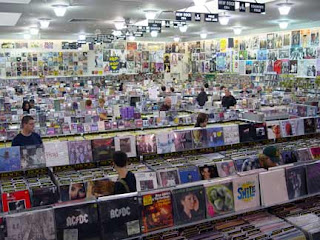From today's Lake County News-Herald:
Carol (Mowrey) WalkerWhen my family moved back to Mentor in 1983, my entire life was uprooted. I was never a "popular" kid by any stretch of the imagination, but I had a lot of friends in Southfield which made the terrifying proposition of going from a school the size of Alice J. Birney middle school to a comparative monstrosity the size of Southfield-Lathrup Senior High School a little less fearsome than it was. Thus, the news that we were moving and that I was to start ninth grade not surrounded by friends but instead by total strangers absolutely gutted me. Worse, we moved to Mentor at the precise start of the school year, so there was no time to get acclimated to the neighborhood or meet new friends before classes started.
04/22/2007
A memorial service for Carol (Mowrey) Walker, 62, of Mentor, will be 10:30 a.m. Saturday at Maplegrove Alliance Church, 36400 Maplegrove Road, Willoughby Hills.
Mrs. Walker died April 13, 2007, at Hospice House in Cleveland.
Born Nov. 23, 1944, in Cleveland, she had been a longtime Mentor resident.
A homemaker, Carol graduated from North High School and was an alumna of Baptist Bible Seminary and Cedarville College and also a graduate of Lakeland Community College. She was a very active member of Emmaus Bible Fellowship Church in Mentor. Carol was a lifelong learner and a perpetual student.
Survivors are her husband of 42 years, T. James "TJ" Walker; mother, Dorothy (Nimmo) Mowrey of Mentor; daughter, Laura L. (Nick) Marino of North Bloomfield; sons, Eric J. (Leah) Walker of Copperas Cove, Texas and Bryan J. (Jennifer) Walker of Painesville; and grandchildren, Joseph, Emily, Joshua, Zoe, Jonathan, Melody and Jacob.
Her father, Joseph Mowrey, is deceased.
There will be no calling hours at the funeral home. The Rev. Denny Hoynes of Emmaus Bible Fellowship Church will officiate at the service.
The family suggests contributions in Carol's name to Hospice of the Western Reserve, 300 E. 185th St., Cleveland, OH 44119.
Arrangements are being handled by Davis Funeral Home in Willoughby.
Shore Junior High didn't do much to improve my mental state upon arrival. It was a soul-crushing construct: drab, and prison-like, smelling of tile cleaner and populated by a sea of unfamiliar, hostile faces. Alright, it might not have been that bad, I suppose, but a sudden crushing shyness and insecurity had gripped me the minute we left Michigan and stayed with me nearly all the way through my high school years. Despite all of this, within days of starting at Shore, I had found myself a new friend.
I am a bit ashamed to admit that I can't remember anymore what class we had in common (or how we had met otherwise), but we shared a similar interest in strategy games and listening to Top 40 music on the radio, and that was all I needed to make a connection. That new friend was Bryan Walker, and we spent most of ninth grade at each other's houses watching movies, playing Advanced Dungeons & Dragons and/or Star Frontiers, and just talking for hours about whatever came to our 14-15 year old minds.
When hanging out with friends, it's inevitable that you'll get to know their parents as well, at least to some extent. In the case of Bryan's family, I never knew his father well, but I liked his mother, Carol, pretty much from the instant we were first introduced. She was rarely in a bad mood, always made me feel welcome, and struck me as one of the sweetest, kindest people I had ever met. In addition to sharing the same first name and middle initial as my own mother, there were times I almost felt like Carol was a kind of surrogate mom to me: perhaps sensing my insecurities and shyness, she always made a point to tell me it was good to see me, or that I was looking better or complimenting my speaking voice or what-have-you. At the time, I was usually embarrassed by all of this and would sheepishly blush or squirm and murmur a "thanks," but I realize now that she quietly helped me to reacquire some measure of my confidence and self-image over those first few years when all I wanted was to get the hell away from Mentor High School and run back to Southfield, where I at least felt like I belonged.
I've only talked to Bryan a handful of times over the last few years, and haven't been back to see his old house or his parents in upwards of two decades now. Despite this gap, hearing the news from Bryan yesterday (as well as how long this had been coming) left me just as crestfallen as if I'd seen Carol just last month. For someone so caring and kind to have suffered as long as she did feels terribly unfair, and I feel both relieved for her that it's over at last, and also profoundly sad for Bryan, his father and his siblings for what they have lost.

